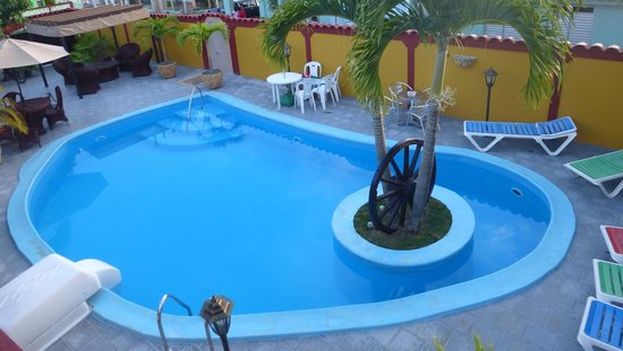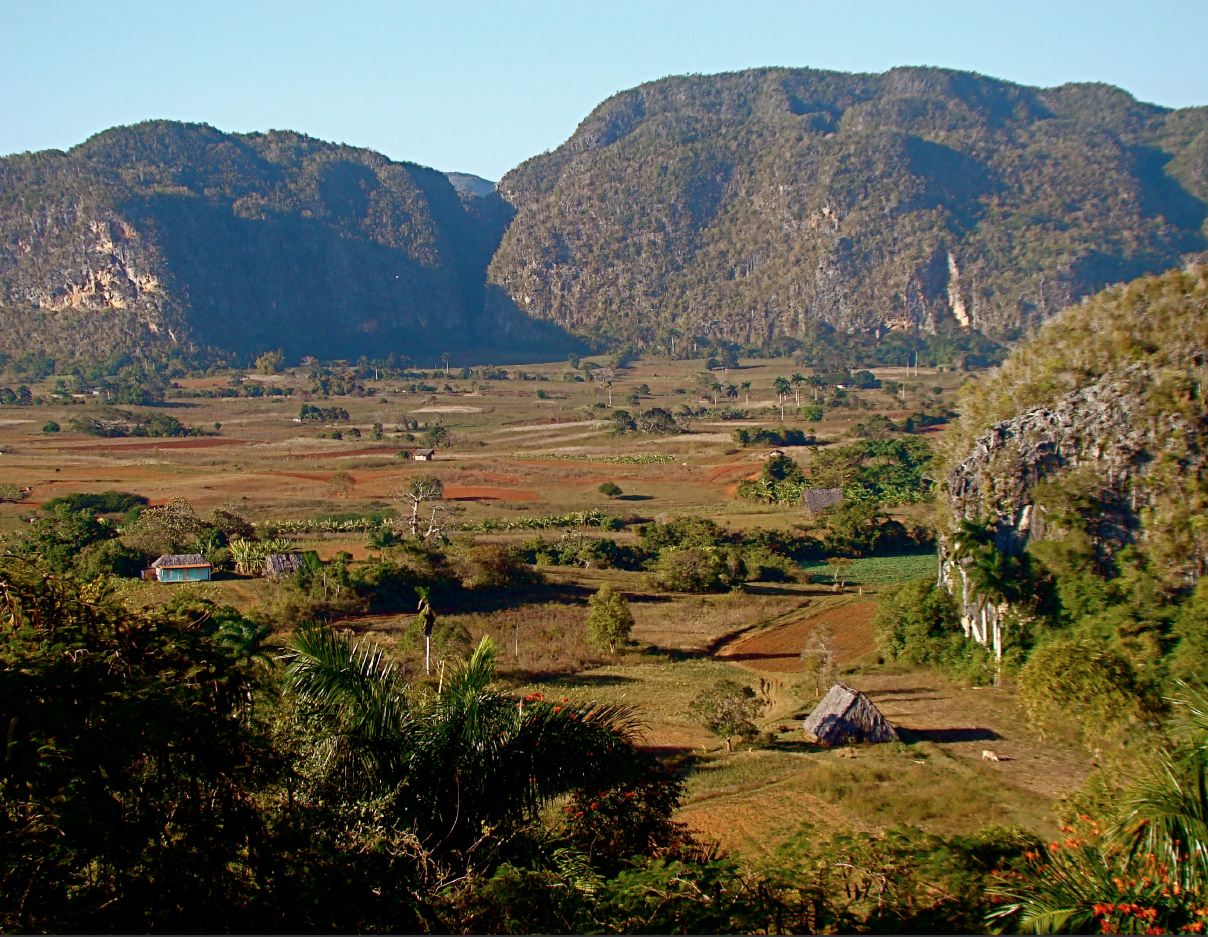
![]() 14ymedio, Zunilda Mata, Vinales, 23 August 2016 – The tables are ready, the glasses shine on the tablecloths and the bar displays a wide variety of beverages. Nevertheless, the restaurant is closed. Some months ago, the ample dining room of Casa Nenita, in Viñales, was full of tourists, but the construction of a pool resulted in the cancellation of the owner’s license for renting rooms and selling food.
14ymedio, Zunilda Mata, Vinales, 23 August 2016 – The tables are ready, the glasses shine on the tablecloths and the bar displays a wide variety of beverages. Nevertheless, the restaurant is closed. Some months ago, the ample dining room of Casa Nenita, in Viñales, was full of tourists, but the construction of a pool resulted in the cancellation of the owner’s license for renting rooms and selling food.
The drama that Emilia Diaz Serrat (Nenita) is living through is repeated all over the beautiful valley of Viñales among those dwelling owners who decided to build a pool. The local authorities have required that these entrepreneurs demolish what was built or convert into enormous flower beds the works intended for a refreshing dip.
A muffled fight, which newcomers barely notice, strains the paradisiacal valley crossed by wooded hills, caves and fields of tobacco. More than five years ago and before the touristic flowering of the region, self-employed workers devoted to renting rooms took a further step to diversify their services and began building their own pools.
However, at the beginning of this year and by surprise, the Municipal Administration Council decreed the closure of all of them and cancelled the rental licenses of those who resisted obeying. The local authorities even used satellite images to detect those striking blue circles or rectangles in the backyards of houses.
Roque, 38, is a private taxi driver who makes the trip between Havana and Viñales every day. Born in the beautiful Pinareño town, he knows each story of the place like the back of his hand. “What they have done here has no name,” he comments while driving his car through the unpaved streets on the periphery of the tourist epicenter.
“They say that the problem is the water, but in recent months it has rained a lot here, and the Jazmines Hotel pool (state-owned) is always full,” complains the man. So are those of La Ermita lodging and the popular campground Dos Hermanas, which belong to the state. Like a good many local residents, Roque believes that the measure is “an extremism” by the authorities against “those who produce more money in the area.”
The Viñales hosts pay the Tax Administration Office (ONAT) about 35 CUC every month as a license fee for each room that they rent. To that is added 10% of their income and payments for social security.
At first there were plastic pools bought in stores like those of Plaza Carlos III in Havana for a price of between 600 and 1,800 CUC. Hardly a water reservoir where customers could cool off from the torrid summer and fulfill their dreams of an idyllic vacation on a Caribbean Island.
The accommodations with a pool had an advantage in a town with 911 dwellings that are licensed for renting and in which more than 80% of tourists who arrive in the Pinar del Rio province spend the night. Offering a swim in the garden was a plus for attracting clients.
Little by little, the temporary became permanent. Glamorous designs replaced the plastic of the first, almost infantile pools. Beautiful ones, with islands of coconut palms set up in the center, an irresistible blue depth and sophisticated pumping system, began to appear everywhere. The investments in some cases exceeded 8,000 CUC.
In Cuban stores they barely sell the bleach compounds, disinfectants or products necessary for cleaning pools, but a thriving informal framework provides everything needed for their maintenance. In most cases the products are imported personally and receive authorization for entry in Customs, or they are diverted from the state sector.
The Viñales self-employed had to overcome all those obstacles, and at no meeting of the group of Dwelling Landlords or in the Delegate “Accountability Assemblies” were they warned to discontinue their renovations, a detail that they now reveal in order to try to stop the official assault.
Some sought solutions in order not to depend on water supplied through the pipes that arrive from the street. “When they told us that the problem could be the water, I hired a state brigade to dig a well, but not even that way could we stop this curse from above,” says M., owner of one of the houses whose license was withdrawn and who preferred to remain anonymous for fear of reprisals.
The onslaught came from all sides. Thirty-two rental licenses were withdrawn and only the homeowners who obeyed the sudden order to demolish or fill in their pools with dirt kept their permits. Those who raised their voices to complain about what is happening have received the treatment for “counter-revolutionaries” and a greater surveillance of their movements, they protest.
“We have hired a lawyer, the head of a provincial firm, in order to advise us, but so far it has not helped at all,” complains M. “We have gone many times to the People’s Municipal Power and the Municipal Party, but we have not gotten coherent answers.” He clarifies, however, that they do not want to turn this “into a political issue, because otherwise they will never arrive at a solution.”
Dozens of these owners even spent a night in a park in order to have a meeting with the president of the Provincial Assembly of the People’s Power, but the meeting never took place. They were surrounded throughout the wee hours by agents of the Special Brigade, two police patrols and a bus from the Technical Department of Investigations (DTI) as if they were a gang of dangerous criminals.
“Here the state invests little and demands a lot,” explains an employee of the Olive Tree restaurant, located on the main street of Viñales. “We have raised this place up, the entrepreneurs, because twenty years ago this place was half dead and today it is one of the country’s most important tourist destinations.”
In September 2014, Resolution 54 from the Institute of Physical Planning made clear that it would not award new licenses for the construction of pools, but the majority of the 28 that are in dispute today in Viñales were built before that date. In January of this year, the Official Gazette introduced new fees for the use of pools in the private rental sector.
A letter sent to Raul Castro in June by a group from the area of rental property owners affected by the prohibition is still unanswered. “We decided to make this report to you so that you may know that the doors to development in this country are closing,” say the claimants in the missive. Some of them talked hopefully this weekend of a prompt correction of the measure, but their predictions are more like hopes than certainties.

They do not understand a decision that they think was made in a “precipitous manner” and “without taking into account the consequences that this would bring for tourist development” in the area. In the text that they delivered to the Council of State’s Office for Attention to the People, they characterize the measure as “unjust, disproportionate and out of step with the times in which we live.”
“I’m not going to empty the pool,” Nenita emphatically says under the inclement August sun, and meanwhile on her whole property not even the buzz of a fly was heard. The residence has been empty for weeks although in the streets of the tourist center visitors are stacked up in search of a room and on the TripAdvisor booking site her house is the best rated in the area.
Six other hosts also are prepared to “continue fighting” to keep their pools, in which, right now, no tourist bathes and which are only beautiful mirrors of water reflecting the mogotes, Viñales’ striking landforms that played an important part in its designation as a UNESCO World Heritage Site.
Translated by Mary Lou Keel
